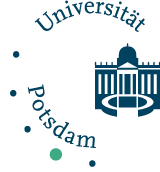Doctoral Researchers

Alexander Gaus
Master of Political Science, Public Law and Cultural Anthropology
Campus Griebnitzsee
DFG-Research Training Group "WIPCAD"
University of Potsdam
Department of Economics
and Social Sciences
August-Bebel-Straße 89
14482 Potsdam, Germany
Office: Campus Griebnitzsee, House 7,
Room 3.07.211-15
Research topic
“The Management of Transgovernmental Networks: Strategies, Goals, and Impact on Inter-agency Collaboration”
Curriculum vitae
STUDIES & EDUCATION
09/2011 – 12/2013
Postgraduate Diploma in Public Management (non-resident program) at the University of London, School of Oriental and African Studies, UK. Focus: Organizational Change, Human Resource Management, e-government.
09/2009
Visiting Fellow at the University of Oxford, Jesus College, UK. Scholarship from the University of Oxford and Albert-Ludwigs-University of Freiburg.
10/2003 – 07/2009
M.A. (Magister Artium) in Political Science, Public Law and Cultural Anthropology at Albert-Ludwigs-University of Freiburg, Germany. Focus: International Relations and Development Studies.
09/2005 – 06/2006
Diplôme d’Administration et Politique Internationale at Université Pierre Mendès France, Grenoble, France. Focus: European Affairs and International Public Law program. Erasmus scholarship recipient.
PROFESSIONAL EXPERIENCE
04/2010
Global Public Policy Institute, Berlin. Think Tank. Research Associate.
10/2009 – 02/2010
German Technical Cooperation (GTZ), Gaborone, Botswana. Public Sector. Intern: Working at the „GTZ Peace & Security, Democracy and Governance Program“ advising the secretariat of the Southern African Development Community (SADC).
02/2009 – 03/2009
Adelphi Research, Think Tank, Berlin, Germany. Think Tank. Intern: Research within the project „Initiative for Peacebuilding“ of the European Union.
TRAINING AND PROFESSIONAL DEVELOPMENT
03/2012
Project Planning, Monitoring and Evaluation training at the Humboldt University, Berlin. Focus: Project-cycle management, results-based management and budgeting, development of monitoring systems, principles of evaluation.
08 – 09/2007
Summer Schools on Human Rights and International Humanitarian Law at the German Red Cross and German Institute for Human Rights, Berlin.
Publications
PUBLICATIONS (Selection)
Gaus, A. (under review) `Conflicting organisational goals in transgovernmental networks: a challenge to global public policy ́, Policy and Politics.
Gaus, A. (forthcoming) `Transnational Policy Communities and Regulatory Networks as Global Administration ́, in: XYZ (eds.) Oxford Handbook on Transnational Public Administration.
Gaus, A. (2016) `How do actors avoid institutional war in network organizations? Institutional change projects in the International Competition Network ́, paper prepared for the 12th Workshop on New Institutionalism in Organization Theory; Lucerne, March 31-April 01, 2016.
Gaus, A. (2015) `Speaking Truth to Power and Control in Transgovernmental Networks ́, paper presented at the ICPP 2015 International Conference on Public Policy, Milan, Italy; 1 - 4 July 2015.
Gaus, A. (2014) `A conceptual framework of (transgovernmental) network management ́, paper prepared for the 2nd International WIPCAD Conference, University of Potsdam; 4-6 December 2014.
Gaus, A.; Hoxtell, W. (2014) Connecting Security and Development: Towards a Transatlantic Strategy in Fragile States. German Marshall Fund of the United States. Winning entry 2014 Brussels Forum Young Writers Award.
Gaus, A.; Eckhard, S. (2014) No Surprises in South Sudan, or in the Central African Republic. Le Monde Diplomatique. English Edition. Online.
Gaus, A.; Hoxtell, W. (2013) The EU-US Development Dialogue: Past, Present and Future. GPPi Working Paper.
Gaus, A. (2012) Food Security: A mapping of European Approaches. GPPi Research Paper no. 15.
Gaus, A.; Mathys, C.; Steets, J. (2012) Food assistance policy and institutions in the United States and European Union, in: Barrett/ Binder/Steets: Uniting on Food Assistance. Routledge.
Gaus, A.; Steets, J. (2012) The challenging path to a global food assistance architecture, in: Barrett/ Binder/Steets: Uniting on Food Assistance. Routledge.
Gaus, A.; Steets, J. (2011) Against the Grain. The world needs a new food assistance pact to cope with the tragedy in the Horn of Africa. Foreign Policy. Online.
Gaus, A.; Sandhu, J. (2011) The Debating Chamber – Time for real leadership for the world’s hungry. AlertNet. Online.
Gaus, A. et al. (2011) How to Reform the Outdated Food Aid Convention. GPPi Policy Brief no. 1.
PRESENTATIONS
Interventions in Haiti – A Case Study, at the conference “The States They Are A-Changing”, International Conference for Political Science Students, University of Bremen, April 2012.
The changing global food assistance architecture, at the Panel “Uniting on Food Assistance: The EU and the US Policy and Practice”, World Conference on Humanitarian Studies, Tufts University, June 2011
The global food assistance architecture, 5th Transatlantic Dialogue on Humanitarian Assistance, Washington DC, March 2011
Opportunities and challenges of renegotiating the food aid convention, expert input at the German Bundestag, closed hearing, Berlin, March 2011
Abstract
From wicked problems to virtuous solutions: Networked bureaucracies and the challenges of addressing uncertainty
The past decade has seen a rise of new forms of governance dealing with complex global challenges that merit the label “wicked”. Much credit
is given to transgovernmental networks of government officials working in ministries or state agencies for effectively addressing highly contested issues on a global level. Global business regulation is an area where such networks are active and my research explores one such network, the International Competition Network (ICN). The central questions to answer are how the ICN is managed and how management and leadership influences the institutional characteristics and dynamics of this virtual network of antitrust agencies. To guide the analysis, the study draws on network theory as well as insights from organizational studies, sociology and management research. The research aims to contribute to public administration and management studies, increasingly turning to different forms of international organizations, including networks. In addition, the research project will provide insights on successful network management strategies to practitioners.
